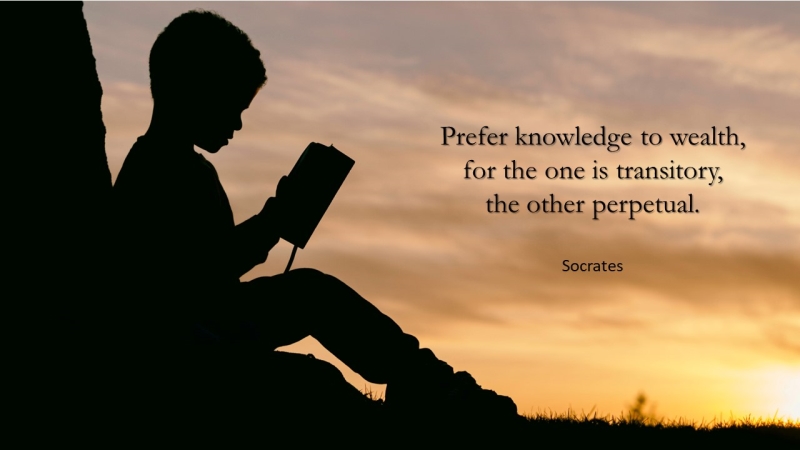AS HUMANS, WE ARE OFTEN TAUGHT THAT WEALTH IS THE ULTIMATE CURRENCY IN LIFE. We try to get money, fame, and other things because they will make us happy and give us a sense of fulfillment. However, wealth is a fleeting currency that can disappear as quickly as it came. In contrast, knowledge is a currency that lasts a lifetime and provides many benefits. This article will discuss why knowledge is more important than money.
The Limitations of Wealth
While wealth can provide temporary happiness and comfort, it does not guarantee long-term fulfillment. Money can be lost or stolen, material possessions deteriorate or become obsolete, and fame and popularity can be temporary. Also, having a lot of money often comes with restrictions and limits, like living a certain way and meeting societal expectations.
The Benefits of Knowledge
On the other hand, knowledge is a currency that provides many benefits. It can be a springboard for learning and development, a doorway to new experiences, and a chance at a lifetime of rewards. Knowledge can always be added to and made more significant, so there are always more ways to learn and grow.
The Practical Benefits of Knowledge
One of the most significant benefits of knowledge is its practical application. Knowledge improves decision-making, enhances problem-solving skills, and increases creativity and innovation. We can make better decisions and solve problems if we understand the world more deeply. This can help us succeed in many areas, like our relationships and jobs.
The Social Benefits of Knowledge
Knowledge can improve communication skills, build confidence and self-esteem, and promote understanding and empathy. Another benefit of knowledge is its ability to enhance social skills. When we better understand the world and those around us, we can communicate more effectively and build stronger relationships. This can lead to a more fulfilling personal and social life.
The Economic Benefits of Knowledge
Knowledge can also have significant economic benefits. It can lead to more job opportunities and higher pay, encourage entrepreneurship and new ideas, and help a society’s economy grow and develop. When we have a specialized skill set or area of expertise, we become more valuable in the job market, and our earning potential increases. Also, when society emphasizes education and knowledge, it can lead to improvements in many fields, which can help the economy grow and develop.
The Personal Benefits of Knowledge
The most important benefit of knowledge is its ability to provide a sense of purpose and fulfillment. When prioritizing knowledge, we enable personal growth and development, leading to a more fulfilling life. Knowledge can also contribute to our well-being and happiness, creating a greater sense of contentment and satisfaction.
The Limitations of Focusing Solely on Wealth
Focusing solely on wealth can lead to a variety of limitations and challenges. Wealth can lead to isolation and loneliness, as wealthy people may struggle to connect with others on a meaningful level. Additionally, wealth can lead to a lack of purpose and direction, as those prioritizing wealth over personal growth and development may need help finding meaning in their lives. Finally, wealth can lead to a sense of entitlement and arrogance, causing individuals to lose sight of humility and empathy.
Cultivating a Love for Learning
Many people may argue they need more time, resources, or abilities to pursue knowledge. However, knowledge is more comprehensive than formal education or advanced degrees. Anyone can develop a passion for learning by reading, listening to podcasts or lectures, watching documentaries, or attending workshops and seminars. By consciously learning something new every day, we can expand our minds and foster a lifelong love for knowledge.
Overcoming Challenges in the Pursuit of Knowledge
Pursuing knowledge is challenging. Finding the motivation and discipline to keep learning can be tough, especially after a setback or failure. But if we have a growth mindset and see problems as chances to grow, we can get past these problems and keep learning for the rest of our lives.
Fear of Failure. One of the biggest challenges in pursuing knowledge is the fear of failure. Many people hesitate to try new things or follow a new field of study because they want to be better and succeed. However, this fear can be overcome by adopting a growth mentality.
A growth mindset is a conviction that one’s talents and IQ can be enhanced through intentional effort. This way of thinking lets us see problems as chances to learn, grow, and enjoy learning instead of just focusing on the end result. Adopting a growth mindset can help us overcome our fear of failure and give us the discipline and drive to keep learning, even when things don’t go as planned.
Need for More Resources. Another challenge in pursuing knowledge is the need for more time and resources. Many people feel they need more time or financial resources to pursue their interests or further their education. Conversely, technology and online learning platforms have made it easier for people anywhere in the world to get information and learn. People can follow their interests and learn new skills with the help of many free online courses and resources.
Lack of Motivation. It is also essential to recognize that pursuing knowledge can be challenging. Learning can be a slow and arduous process, and it may take time to see the results of our efforts. However, by setting realistic goals and breaking down our learning into manageable steps, we can stay motivated and focused on our path toward knowledge.
Ultimately, the best way to deal with problems in pursuing knowledge is to stick to our goals and keep trying. We can keep learning and improving by staying interested, taking on new challenges, and learning from our mistakes.
The Importance of Sharing Knowledge
Finally, it is essential to acknowledge the importance of sharing knowledge with others. Sharing our knowledge and expertise contributes to our communities and society’s growth and development. We can mentor and inspire others, creating a ripple effect of knowledge and change. In this way, knowledge becomes a currency that benefits us and those around us.
Conclusion
In conclusion, the power of knowledge cannot be overstated. While wealth may seem like life’s ultimate currency, its benefits are fleeting and limited. For a short time, wealth can bring comfort and happiness. Still, knowledge is a currency that lasts a lifetime and gives you a lot of chances to grow personally and professionally.
With more knowledge, we can make better decisions, get along better with others, earn more money, and, ultimately, live happier lives. By pursuing knowledge first and working through problems, we can develop a lifelong love of learning and help our communities and society grow and improve.
CLICK THE IMAGE TO LEARN MORE




